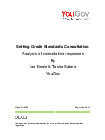Setting standards for new GCSEs in 2017
GCSEs will be graded 9 to 1, with 9 being the top grade. New GCSEs in English language, English literature and maths from September 2015.

Exams regulator Ofqual today (Friday, September 12) confirms how grading will work when new GCSEs are awarded for the first time.
New GCSEs in English language, English literature and maths will be taught in schools in England from September 2015, with students getting their results in August 2017.
The new GCSEs will be graded 1 to 9, with 9 being the top grade. Ofqual has consulted on proposals for how standards should be set for them, and how the grading scale should work.
Chief Regulator Glenys Stacey said:
How grade standards are set is an extremely important issue, and we were very encouraged by the quantity and quality of the responses to our consultation.
We have given them a great deal of consideration, and can now confirm how things will work when the three new GCSEs are awarded in 2017.
We are being quite clear that the approach in that first year will draw heavily on statistical evidence to make sure that there are clear ‘anchor points’ from the old system to the new.
This will make sure that the year group of students are not disadvantaged, or advantaged, because of the introduction of the new qualifications, and will provide some certainty about what to expect at this time of significant change.
The approach will mean:
- Broadly the same proportion of students will achieve a grade 4 and above as currently achieve a grade C and above
- Broadly the same proportion of students will achieve a grade 7 and above as currently achieve an A and above
- For each examination, the top 20 per cent of those who get grade 7 or above will get a grade 9 – the very highest performers
- The bottom of grade 1 will be aligned with the bottom of grade G
- Grade 5 will be positioned in the top third of the marks for a current Grade C and bottom third of the marks for a current Grade B. This will mean it will be of greater demand than the present grade C, and broadly in line with what the best available evidence tells us is the average PISA performance in countries such as Finland, Canada, the Netherlands and Switzerland
- The new maths GCSE will be tiered, with grades 4 and 5 available through both tiers
Glenys Stacey said:
We do need to caution against direct comparisons and overly simplistic descriptions of the approach. For example, it is not right to say simply that a new grade 4 will equal a current grade C. The read across is at the bottom of each grade, so that broadly the same proportion of students will get 4 and above as currently get C and above. A subtle but important difference.
From our formal consultation and conversations with teachers and parents, we know some people may not have fully comprehended our plans for grade 5 and international comparisons. To try and clarify this, it is not about putting in place any direct links or ties to any grades set elsewhere. Rather, where grade 5 sits within the grading scale will place it above a current grade C, and broadly in line with what the best available evidence tells us is the average performance of 16-year-olds in high performing countries.
Beyond 2017, our aim will be to maintain the standards set in that first year of awarding. We will continue with the approach we currently use – statistical evidence used to help examiners make judgements on where to set grade boundaries. We will improve this approach by developing a national reference test to provide additional statistical information.
We have produced a set of postcards with more information on new GCSEs, AS and A levels.
For more information journalists should contact:
Press office
Press office 0300 303 3342
For enquiries from journalists only.
Last updated 27 November 2014 + show all updates
-
Linked to the related documents.
-
First published.
